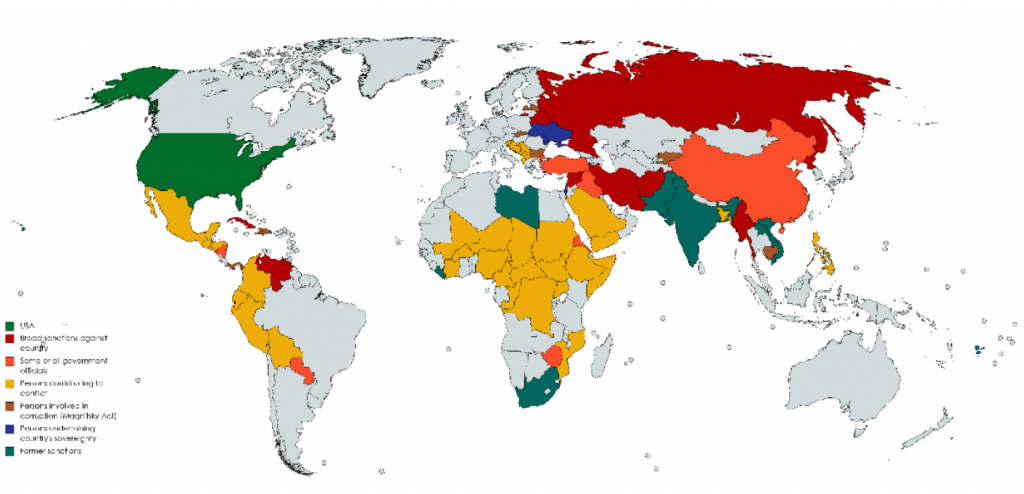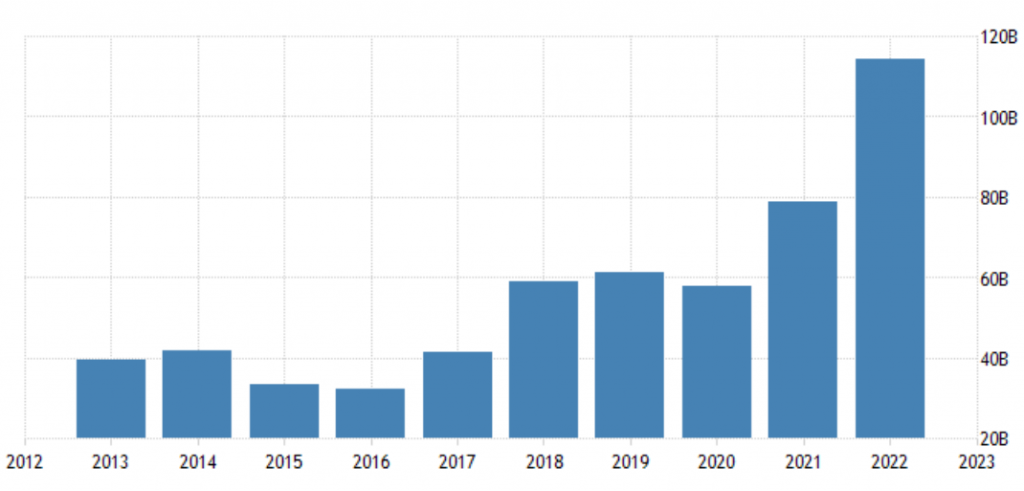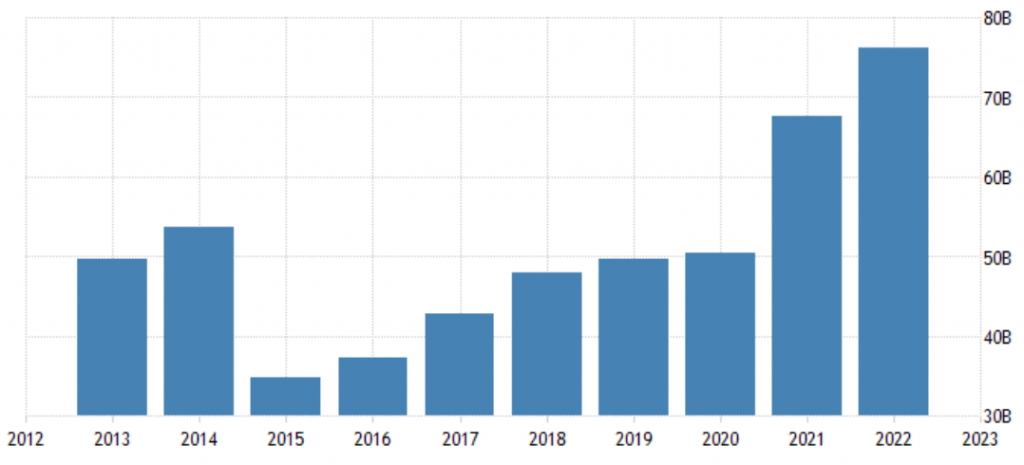Russia carried out on February 24, 2022 an invasion that few anticipated and that neither they nor Western states have found it satisfactory for their interests. There is only one actor who is benefiting from Putin’s risky move, and this is China. Also, the invasion of Ukraine has started a succession of events, fundamentally at an economic level, which leave to the United States in a position of international influence weaker than ever.
Bretton Woods: the beginning of hegemony
In 1944 the first agreements that would cement the hegemony of the dollar were forged. Through the Bretton Woods agreements would finance the reconstruction of Europe, forming an international economic order, giving stability to commercial exchanges through the dollar and ensuring a strong exchange rate by adopting the gold standard.
After nearly thirty years of US leadership, in August 1971, war spending led to a trade deficit for the first time in the 20th century and the Nixon administration broke the trade agreements Bretton Woods preventing conversions from the dollar to gold. From this moment you could issue money without gold backing, being able to finance its indebtedness.
This new system based the dollar on the economic confidence of the United States, forming an infinite cycle of debt.

Image 1: Cycle of debt
The system can be described as follows:
1- The United States carries out military expenditures abroad without any kind of restriction
2- The benefit of said military spending was invested in goods and services of agents foreign economic
3- Foreign agents change to local currency, which allows central banks get dollars
4- Since there is no gold to back the dollar, it is backed by US Treasury bonds USA
Support for this complete control of the world economy would be more supported after the agreement with Saudi Arabia in 1974. Until now, dollar sanctions strangled through agricultural production, but after the agreement with Saudi Arabia, they would also do so through of the crude market. However, economic power would be cut short when companies of the United States sought a greater benefit, underestimating the economic power. Carry the production to countries like China led to increased dependence on it and, in consequently, granting them a role of greater weight in the international context.

Image 2: Long-term view on US trade with China
The economic scenario after the start of the conflict
Russia’s invasion of Ukraine has hit the world economic system again. Such as Pozsar affirms in his report for Credit Suisse, we are facing the end of domination of the dollar, since the number of countries affected by the sanctions has caused them to consider avoid said sanctions through economic exchanges outside the dollar. An example we have with the recent news about the yuan payment by Brazil or the search for part of various BRICS ministers to find a new single currency as a means of de-dollarization.

Image 3: Currency map
Since the beginning of the conflict, the following sanctions against Russia have been seen:
– Freezing of assets of the Russian central bank in the European Union, USA, United Kingdom and Canada
– United Kingdom Ban on lending money to Russian firms
– The European Union has stopped importing coal and refined oil
– The United Kingdom and the United States have banned oil and gas imports
– Germany stopped the opening of Nordstream 2 (which was later destroyed)
This scenario seems to have been foreseen by Russia before the start of the conflict because, as can be seen, imports and exports with China increased significantly in 2021.

Image 4: Imports from China to Russia

Image 5: Exports from China to Russia
Winners and losers
Going deeper into the consequences that the conflict is having, we can observe that there seem to be too many states coming out stronger.
First of all, Russia has been harmed economically, as the sanctions have had a significant effect on her income in addition to diplomatically isolating many of the countries, especially as a result of the arrest warrant against Putin issued by the Criminal Court International. In addition, it is worth noting the strong reputational impact that it has had on the perception of Russian military capabilities in the face of the blockade of the conflict, even declaring United States Secretary of State Antony Blinken: “Many of us saw Russia as the second army in the world, but now many see it as the second army of Ukraine”.
Finally, there are the internal consequences at the political level of not ending the conflict of satisfactorily, since internal criticisms are already appearing about the political position that is taking Putin and his removal from Europe.
Europe is not benefiting either, as the sanctions are beginning to affect the economy, for example, Germany, which has officially entered a recession. Also they rapprochement plans with Russia, since either the German ostpolitik or the search for European independence that France has tried to promote have been greatly affected by the Putin’s move.
Despite the fact that the trade blockades have favored the United States, especially in regarding liquefied gas, the international position has been adversely affected by the new position of the dollar in relation to international trade, so the balance cannot be positive. In addition, the significance in the conflict distances him as a possible mediator of the contention.
Finally we have China. The conflict has been a turning point in his position therefore, not only does it seem to be exercising a role of mediator, as has been able in the agreements between Saudi Arabia and Iran, but has taken a more relevant role as an economic actor, for example with Russia, which has come to depend in a very important in China. Also other countries such as Brazil or Argentina are signing agreements for the use of the yuan in commercial exchanges or proposals about an alternative to SWIFT backed by India or Russia.
The parallelism between Donbas and Taiwan has also allowed China to assess the repercussions of an annexation through military methods and anticipate what type of sanctions and in what context the different States are willing to assume, which allows you to draw the best lines of action in case of a hypothetical invasion.
Conclusions
There is no doubt that the so-called multipolar scenario has been accelerated by the repercussions derived from the conflict, especially due to the positions taken by the United States, which seems to point to a de-dollarization trend. But not only is that, for the international system based on idealistic ideas fundamentally based on the penalty for breaking the rules of the game, which are, in this case, the sanctions economic. The conformation of a new scenario where the breaking of these rules is not penalized will create a direct confrontation with the system proposed by Woodrow Wilson, putting the international system in jeopardy, appearing a series of countries that are willing not to leave out of the economic system those who break the rules.
The new status quo and China’s leadership have allowed it to position itself as the great beneficiary of the Russian move, taking advantage of a succession of actions by third countries so favorable that it is hard to believe that it is solely due to chance.
References
https://plus2.credit-suisse.com/shorturlpdf.html?v=4ZR9-WTBd-V
https://blogs.elconfidencial.com/economia/tribuna/2022-07-01/acuerdos-brettonwoods_3452964/




Leave a Reply